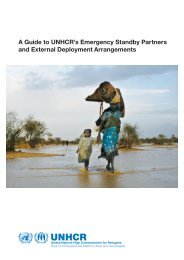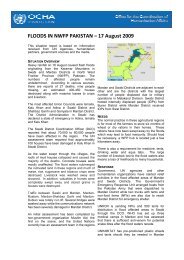Advocacy and resource mobilisation - OneResponse
Advocacy and resource mobilisation - OneResponse
Advocacy and resource mobilisation - OneResponse
Create successful ePaper yourself
Turn your PDF publications into a flip-book with our unique Google optimized e-Paper software.
<strong>Advocacy</strong> <strong>and</strong> <strong>resource</strong> <strong>mobilisation</strong><br />
A range of capacities are needed for cluster coordination at both national <strong>and</strong><br />
sub-national levels. In most emergencies the Coordinator <strong>and</strong> sub-national<br />
coordinators/focal points will either be the sole cluster staff members, or will<br />
work as a small co-lead team undertaking cluster coordination responsibilities in<br />
addition to a programming role with the CLA, or a cluster partner agency. In<br />
large emergencies, additional specialist staff may be needed. See section 2.3 for<br />
further details of the Coordinator role.<br />
The Coordinator, with the support of the CLA(s), should take the lead in<br />
identifying where the necessary capacities can be found, <strong>and</strong> bringing them on<br />
board as, or just before, they are required. The Coordinator must also make<br />
adequate provision for any additional costs anticipated in addressing cluster<br />
coordination capacity requirements, eg, for local translators <strong>and</strong> interpreters, or<br />
the recruitment of short-term advisers or consultants.<br />
8.3.3 Mobilising capacities<br />
Once capacity shortfalls have been identified, the Coordinator will need to look at<br />
the options for mobilising both the education programming <strong>and</strong> cluster<br />
coordination capacities required. In doing so, it is important to give equal<br />
consideration to national <strong>and</strong> sub-national capacity requirements.<br />
Depending on the scale of the emergency, the following options for deployment<br />
are available:<br />
� Deployment of existing in-country staff from cluster partners to the<br />
emergency location (a first response).<br />
� Secondment or redeployment of staff based at regional level, or in<br />
other country programmes. UNICEF <strong>and</strong> Save the Children may be able<br />
to redeploy education specialists <strong>and</strong> experienced cluster coordination<br />
staff working in other countries or regional offices.<br />
� External st<strong>and</strong>by arrangements with UNICEF international partners,<br />
such as the Norwegian Refugee Council. Staff are recruited on individual<br />
contracts.<br />
� Recruitment through external rosters or agencies. UNICEF <strong>and</strong><br />
Save the Children have external rosters. Plan International, International<br />
Rescue Committee (IRC) <strong>and</strong> Associazione Volontari per il Servizio<br />
Internazionale (AVSI) also operate rosters, or can mobilize internal staff<br />
with appropriate skills.<br />
� Recruitment of staff within the country or affected location.<br />
� Partnership with NGOs or community-based organisations<br />
(CBOs) within the country or affected location.<br />
� Secondment of staff working in government or national research or<br />
academic institutions, eg, University of Nairobi’s Faculty of Education.<br />
May 2010 | 273











